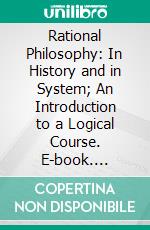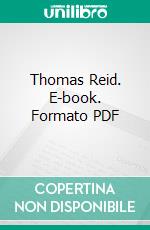Alexander Campbell Fraser eBooks
eBooks di Alexander Campbell Fraser di Formato Pdf
Rational Philosophy: In History and in System; An Introduction to a Logical Course. E-book. Formato PDF Alexander Campbell Fraser - Forgotten Books, 2017 -
Rational Philosophy, as that term is used by me, is a search for Ultimate Truth, or that unity of Reason which is conceived to be the final reward of the philosophical im pulse. It seeks its appropriate intellectual satisfaction through two studies, namely.
Thomas Reid. E-book. Formato PDF Alexander Campbell Fraser - Ionlineshopping.Com, 2019 -
Series Title: Famous Scots series Thomas Reid (1710–1796) is a Scottish philosopher best known for his philosophical method, his theory of perception and its wide implications on epistemology, and as the developer and defender of an agent-causal theory of free will. In these and other areas he offers perceptive and important criticisms of the philosophy of Locke, Berkeley and especially Hume. He is also well known for his criticisms of Locke's view of personal identity and Hume's view of causation. Reid also made influential contributions to philosophical topics including ethics, aesthetics and the philosophy of mind. The legacy of Thomas Reid's philosophical work is found in contemporary theories of perception, free will, philosophy of religion, and widely in epistemology. This little book is an attempt to present Reid in a fresh light, and in his relations to present-day thought. It deals with the Scottish chapter in that enduring alternation between agnostic despair and endeavour after perfect insight which seems to be a law of the philosophic progress of mankind. Thomas Reid, home-bred and self-contained, is the national representative, in the eighteenth century, of the via media between these extremes. In the concluding chapter I have looked at the philosophical appeal to inspired data of Common Sense, in the wider light of the theistic philosophy of the universe, and not merely as part of an inductive science of the human mind. This connects the theistic postulate of spiritual reason, as the foundation of human experience, with Reid’s appeal to the ultimate but often dormant necessities of human nature, a subject treated more fully in my Philosophy of Theism (1896).

